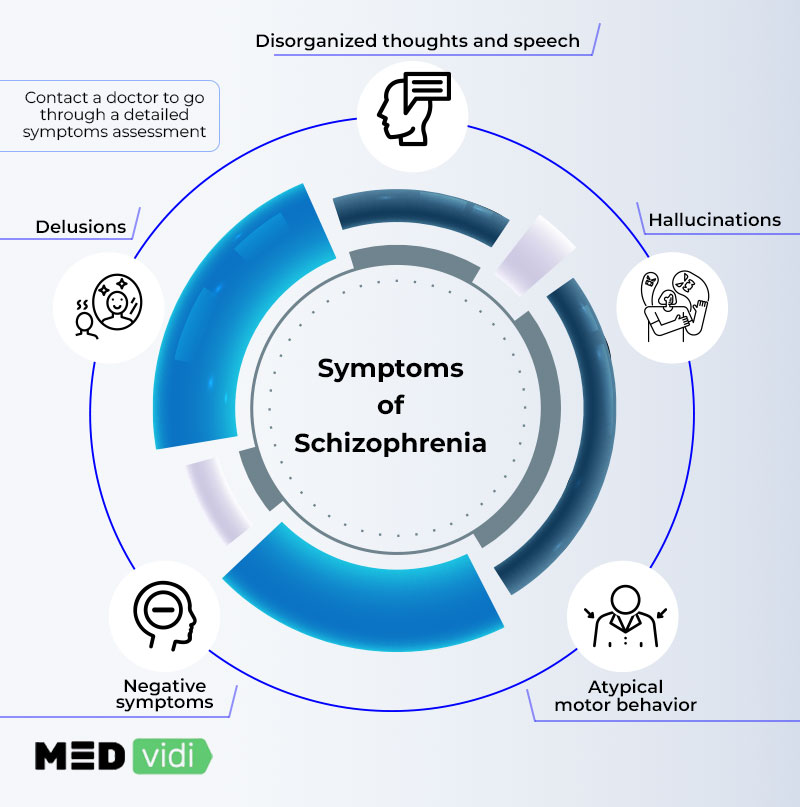Schizophrenia is a severe mental disorder affecting an individual’s perception of reality. It affects how one feels, thinks, and acts. Although schizophrenia symptoms might vary from person to person, delusions, hallucinations, and disorganized behavior or speech are the primary ones.
The symptoms usually start between 20 and 35 years, affecting more men than women. Even so, it is rare to find all the signs of schizophrenia in a person simultaneously. Chiefly, there’s a prodrome phase where the person’s personality changes slightly without any overt symptoms.
When the disease is full-blown, the individual loses the ability to differentiate reality from perceptual distortions. Their daily functioning is impaired, but they never realize something is wrong unless a doctor informs them.
Currently, schizophrenia is not treated at the MEDvidi online clinic. Contact us if you have disturbing symptoms that may also relate to other mental conditions.
What Are the Symptoms of Schizophrenia
The schizophrenia spectrum encompasses multiple disorders that manifest with abnormalities of thought, perception, and behavior or speech that impair an individual’s functioning. The diseases, including schizophrenia, schizophreniform disorder, delusional disorder, brief psychotic disorder, and schizoaffective disorder, have similar symptoms with varying duration and severity. These schizophrenic symptoms can be either positive or negative.
Positive Symptoms of Schizophrenia
These are things that begin happening when a person is dealing with paranoid schizophrenia. Typically, the schizophrenic episode tends to exhibit exaggerated thoughts, ideas, and actions that signify the individual’s inability to differentiate reality from unreality. The positive symptoms of schizophrenia include hallucinations, delusions, disorganized speech, and abnormal motor activity.
Hallucinations
Patients with schizophrenia may see, smell, feel or hear things that do not exist or no one else can perceive. However, to the individual, these perceptions have a full force and impact their behavior. In schizophrenia, hallucinations differ depending on the sense involved, and they can be:
- Auditory. The person hears a voice or voices that might be commanding them to perform certain tasks or commenting about their activities. The voices can be of living people, dead relatives, or supernatural beings. Auditory hallucinations are more common than other types.
- Visual. Often, persons with schizophrenia see people, objects, lights, or patterns that do not exist. In most cases, the people seen are usually deceased loved ones. Distance and depth perception is frequently impaired in these individuals.
- Tactile. A perception disorder in which you feel things like insects crawling under your skin.
- Gustatory and olfactory. Someone feels good or bad taste and smells without eating. As a result, the individual believes they are being poisoned and refuses to eat.
Delusions
Delusions are firm beliefs non-correlating with reality and inconsistent with the person’s educational or cultural background. The affected individual might believe that someone else is controlling their thoughts or they’re being monitored. With schizophrenia, one can experience any of the following delusions:
- Persecutory delusions, such as a belief that someone wants to harm you or that the police are stalking, framing, or hunting you.
- Somatic delusions are centered on the body in which a person thinks they have a bizarre health condition or another body disfiguration. For instance, the person might believe cosmic rays have damaged their intestines.
- Referential delusion occurs when an individual believes that public forms of communication, such as adverts, are special messages directed to them.
- Erotomanic delusions make people with schizophrenia believe that a prominent figure like a celebrity has affection for them. They might even report they are not attracted to those pursuing them for a romantic relationship.
- Grandiose delusions make individuals view themselves as important figures on a national or international stage. A person can claim to be the president of a superpower or a famous musician.
Disorganized Thoughts and Speech
People with schizophrenia can have difficulty organizing their thoughts, leading to disorganized speech and impairing effective communication. The individual might answer questions partially or give unrelated responses. Sometimes, they come up with new meaningless phrases and jumble up words; a phenomenon also called “word salad”.
Atypical Motor Behavior
The disorganized motor behavior in schizophrenia varies widely, ranging from childlike jumpiness to extreme agitation. The individual can assume a bizarre posture for extended periods or repeatedly perform a non-goal directed motion. Other forms of behavior abnormality in schizophrenia manifest themselves in a limited or total absence of response.
Some symptoms require medical assistance to rule out other mental disorders. Click the button below for the ADHD consultation online.
Negative Symptoms of Schizophrenia
Negative symptoms of schizophrenia result from a decline in mental functions such as thinking, perception, and behavior. Simply, they indicate that some things stop happening in an individual’s life and can include:
- Anhedonia. The person is unable to enjoy or find pleasure in previously exciting activities.
- Alogia. It occurs when an individual with schizophrenia no longer speaks as much as they did initially or shows no feelings.
- Apathy. People with schizophrenia are often withdrawn, rarely participate in activities, and are no longer interested in social engagements. Talking to them is very difficult as they don’t enjoy conversations.
- Neglect. Caring for self becomes a huge struggle, as the individuals might stop bathing and tend to be unkempt in general.
- Avolition. One loses the drive to perform tasks, sometimes even missing doctor’s appointments.
- Flat affect. A patient has no smiles, tonal variation, or facial expressions when talking. An individual might not laugh at a joke, even if it’s funny.
The early signs of schizophrenia in adults have periods of remission and exacerbation. Usually, schizophrenia disorder begins in the 20s. Regardless of gender, it is uncommon to diagnose schizophrenia in the extremes of age.

Etiology of Schizophrenia
The causes of schizophrenia are still unknown. However, researchers suggest that the development of this disorder may result from a mix of chemical, genetic, and environmental factors. Schizophrenia tends to occur in family clusters indicating a possible genetic component.
Abnormal levels of brain chemicals such as glutamate and dopamine have been identified as contributors to schizophrenia development. Neuroimaging schizophrenia tests have also shown structural deviations in the brains of people with schizophrenia, but the level of such changes remains indeterminate.
Several symptoms similar to those of schizophrenia may indicate depression, PTSD, and other disorders. Contact us to know more.
Schizophrenia: Risk Factors
The following factors pose a higher risk of developing this disorder:
- History of schizophrenia in a first-degree relative
- History of psychotropic substance abuse in teenage and adolescence
- Certain complications during pregnancy and delivery, including birth asphyxia, high blood pressure, diabetes, maternal malnutrition, and emergency C-section
Complications of Schizophrenia
Without proper treatment, schizophrenia can progress and result in other severe mental health problems, including obsessive-compulsive disorder, depression, and anxiety disorders. It may also lead to suicide in severe cases. Financial problems, school or work delinquency, and alcohol and substance abuse can also stem from untreated schizophrenic disorder.
How to Help a Person Who Might Have Schizophrenia
Individuals having schizophrenia may not understand that their impairments require professional help. Thus, they can only obtain medical help through friends and family.
Do you suppose your friend or loved one is experiencing symptoms of any type of schizophrenia? Try to talk to them about that and encourage them to ask for professional assistance. Offer any necessary support but remember you can’t force them to see a doctor.
Suppose they can become dangerous to themselves or others and cannot care for themselves, contact emergency services for help—suicidal thoughts or behavior warrants emergency admission to a mental health hospital.
In Conclusion
Unfortunately, there’s no way to ensure schizophrenia prevention. However, early detection and treatment of schizophrenic disorders can help prevent complications and enhance the long-term outlook. If you notice some behavior change in a loved one and suspect it might be schizophrenia, contact a counselor or doctor as soon as possible.
Currently, MEDvidi doctors neither diagnose nor treat schizophrenia online. Contact a psychiatrist to go through an assessment if you have any disturbing symptoms.











